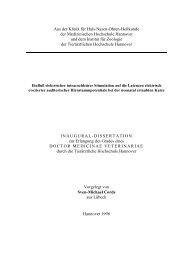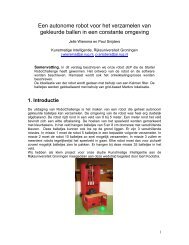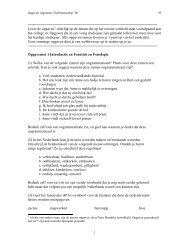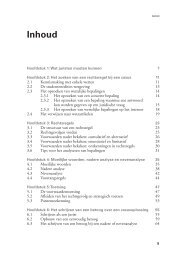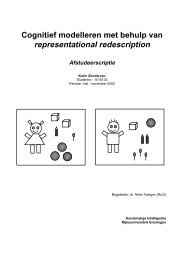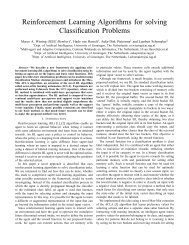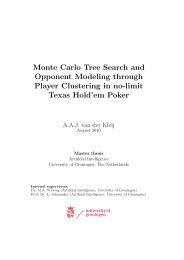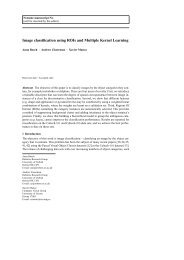Presuppositions in Spoken Discourse
Presuppositions in Spoken Discourse
Presuppositions in Spoken Discourse
Create successful ePaper yourself
Turn your PDF publications into a flip-book with our unique Google optimized e-Paper software.
Chapter 5<br />
5.4 IS THERE A PREFERENCE FOR HIGHER LEVELS OF ACCOMMODATION?<br />
Both Heim and van der Sandt have suggested that higher levels of accommodation<br />
will be preferred over lower levels and evaluat<strong>in</strong>g the likelihood of this proposed<br />
preference <strong>in</strong> relation to the corpus results is the third ma<strong>in</strong> question for this<br />
chapter. These preferences should have resulted <strong>in</strong> GLOBAL be<strong>in</strong>g more frequent<br />
than LOCAL or INTERMEDIATE, and INTERMEDIATE more frequent than LOCAL.<br />
First I will present several explanations given <strong>in</strong> the literature for why there<br />
should be a preference for higher levels of accommodation over lower. Then I’ll<br />
discuss these <strong>in</strong> relation to the corpus data. Factive presuppositions were locally<br />
accommodated as often as globally, so the data does not show a tendency for<br />
higher levels of accommodation over lower levels for all trigger types. I’ll present<br />
an alternative proposal, that there is no general preference for higher levels of<br />
accommodation, and that triggers differ <strong>in</strong> the likelihood with which they will be<br />
used under embedd<strong>in</strong>g, and the behavior of the <strong>in</strong>duced presupposition will also<br />
differ depend<strong>in</strong>g on the type of embedd<strong>in</strong>g.<br />
There are two well discussed accounts for the proposed preference,<br />
contrasted at length <strong>in</strong> Geurts (2001). The first proposal is that backgrounded<br />
<strong>in</strong>formation tends to float up to the ma<strong>in</strong> context. Because presuppositions are<br />
arguably a k<strong>in</strong>d of backgrounded <strong>in</strong>formation they also tend to float up. This<br />
proposal was made by Geurts (1999, 2001), and he terms it the Bouyancy Pr<strong>in</strong>ciple,<br />
or BP. Geurts comments that it still rema<strong>in</strong>s to be expla<strong>in</strong>ed why background<br />
<strong>in</strong>formation should float up, so the BP isn’t really an explanation. The second<br />
proposal argues that the proposed preference is related to the desire of speakers to<br />
make the strongest read<strong>in</strong>g possible. Presupposed <strong>in</strong>formation projected to the<br />
ma<strong>in</strong> context is argued to result <strong>in</strong> a stronger read<strong>in</strong>g than non-globally<br />
accommodated versions, so hearers will tend to globally accommodate. This<br />
account is advocated by those work<strong>in</strong>g on Optimality Theory treatments of<br />
presupposition (e.g. Blutner 2000, Zeevat to appear) and is captured by the<br />
work<strong>in</strong>gs of Blutner’s (2000) proposed constra<strong>in</strong>t BESTRONG. Semantic strength is<br />
usually def<strong>in</strong>ed <strong>in</strong> the follow<strong>in</strong>g way: consider two possible read<strong>in</strong>gs for an<br />
utterance, read<strong>in</strong>g A and read<strong>in</strong>g B. If read<strong>in</strong>g A entails read<strong>in</strong>g B but read<strong>in</strong>g B<br />
does not entail read<strong>in</strong>g A, then read<strong>in</strong>g A is stronger because it would add more<br />
<strong>in</strong>formation to the context than read<strong>in</strong>g B, hence Geurts (2001) terms this the<br />
Informativeness Pr<strong>in</strong>ciple, or IP.<br />
A simple example of how the IP works is given below. The <strong>in</strong>terpretation of<br />
the DRS when the presupposition triggered is globally accommodated, (43)b,<br />
entails the <strong>in</strong>terpretation of the DRS when the same presupposition is locally<br />
accommodated, (43)c, but not vice-versa.<br />
(43) a. If the K<strong>in</strong>g of France is bald, then he lives <strong>in</strong> exile.<br />
b. [ x : KofF(x) [ bald(x) ] → [ lives_<strong>in</strong>_exile(x) ] ]<br />
c. [ [x : KofF(x), bald(x) ] → [ lives_<strong>in</strong>_exile(x) ] ]<br />
138



